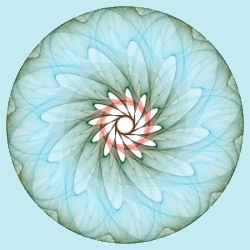
The unity of all in the One.

The unity of all in the One.
|
The Language of Feeling, Part 2
'Feeling' and 'Knowing' in a Time of Darkness
Guruji-Ma If we think of emotional awareness as representing one layer of our conscious experience, then we may find greater ease in looking for other layers that we may not have noticed or had access to before.
Emotions can arise in the body and affect the mind. They can also arise in the mind and affect the body. When we experience emotions or feelings, we are generally aware of these through a combined perception of what our body feels and what our mind thinks. Often, our emotions have been reliable guides to the beliefs we hold most dear. However, in a time of darkness, emotions may become covered over by energies of opposition to light, losing their capacity to guide us as they once did in the important decision-making areas of our life. We may not feel our feelings strongly enough to make such decisions, and may come to a place of doubt or uncertainty about what we once knew to be unquestionably true.
In a time of darkness, ‘feeling’ must often give way to ‘knowing’ as a guide to decision-making with respect to the choices we need to make. This is because feelings, at such a time, are either inaccessible or suspect, due to the influence of other energies. At such times, we need to embrace ‘knowing’ what is true within our deeper self, rather than ‘feeling’ what is true. Often, memory can guide us, for we remember how we have felt over a long period of time. When confusion prevails, even in the presence of memory, and when our ‘knowing’ also appears to be covered over as well as ‘feeling,’ we are called to return to the fundamental principle that is always present in guiding action, namely, the principle of love. In any decision, in any determination about where to go or how to live, it is love that must become the guide, especially when all feeling and all knowing about a particular situation appears to be absent.
Nonetheless, it is rarely the case that both ‘feeling’ and ‘knowing’ are completely covered over by energetic opposition. Sometimes, our ‘knowing’ remains present, but we are afraid to trust it without the usual emotional cues that we have relied on.
Our ‘knowing’ is the representation of our soul to our conscious self. It does not derive from the mind but from the body and from our deeper being. Our knowing is the foundation of what we hold to be right. It remains as our moral compass, based in love.
To trust ‘knowing’ is to trust the deeper part of ourselves. In the presence of doubt and in the absence of clear emotional guidelines to light our way, we ask to be shown the clear path to inner truth and to be separated from all illusion that represents itself as truth. In this way, we fortify our inner knowing with prayer for all help to be given in order to clarify the choices that we are called upon to make. Such help is always available to us, and in a time of darkness becomes the foundation by which and through which we may rise into our own truth. To face the dilemma of coherent guidelines to thought and behavior no longer being what they once were can be frightening. It can feel like we have lost the part of ourselves that was sure of what we believed in. Yet, the moral compass that exists within our soul is still there and can be trusted, even while doubt and confusion on the mental and emotional level are present. This moral compass, founded In love, is the unassailable truth of our deeper being, and it is the sure guide to follow when all else has been eclipsed.
Related Writings:
Article Section - Purification "Maintaining Alignment With Light" |
Artwork - See Mandalas of Life